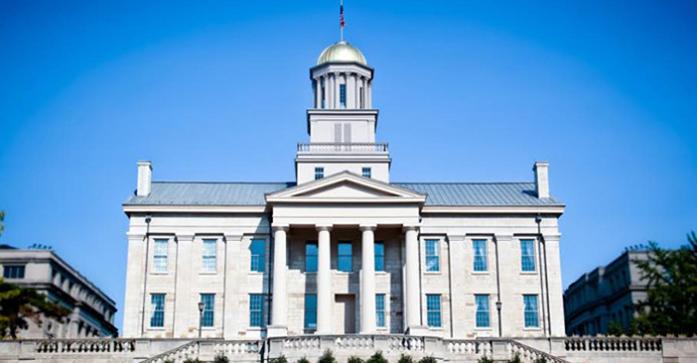During a meeting Tuesday, the faculty senate discussed a sanction imposed on the University of Iowa this summer.
By Marissa Payne & Vivian Le
For faculty and members on the University of Iowa chapter of the American Association of University Professors, the sanction issued against the school this summer remains something faculty hopes to address.
Discussions regarding the sanction were brought up among UI Faculty Senate members at a meeting Tuesday afternoon, and at an AAUP forum on the same day.
During the Faculty Senate meeting, a subcommittee was proposed to lift the sanction placed on the school by the AAUP.
Hans-Joerg Tiede, a member of the national AAUP organization, attended the faculty meeting and the AAUP forum to answer questions and facilitate discussion about removing the sanction.
Tiede said he thinks it is likely the sanction will be removed relatively fast, noting that universities that have been sanctioned, such as the University of Illinois-Urbana/Champaign, have made progress toward being taken off the list.
“For an institution the stature of the University of Iowa to be on the list for a very long time I think would be unusual,” he said. “I think it’s mostly the small, backwater religious sorts of institutions who end up being on the list for a very long time.”
Until last year, Grove City College had been sanctioned since 1963, making it the longest institution to be on the censure list, Tiede said.
Removing sanctions, he said, typically does not happen until there is a policy change addressing the issue that led to the sanction.
“The removal of sanction would primarily involve a change in policy … that recognizes what the role of the faculty in a presidential search should be, and that somehow would be consistent with the AAUP’s principles,” he said.
To make a policy change, Tiede said he believes people need to take a more active role in understanding the role of faculty members in guiding educational policy.
“Educating students, educating the public, educating our students’ parents about why this matters, why is it important that faculty have a voice in educational policy decisions, which ultimately involve the selection of the president as well given the central role that the president ultimately has in the operation of the institution,” he said.
Some members of the Faculty Senate, however, expressed discontent and frustration about the issue.
“There really isn’t much precedent for this,” law Professor Christina Bohannan, a former president of the Senate said.
Bohannan said looking at the AAUP website, there were only six other schools sanctioned before the UI, none of which involved a presidential search.
Many other members of the Senate were frustrated by the lack of clarity given to them to take the first steps toward lifting the sanctions because the policies in question belong to the state Board of Regents.
“I think the formation of the committee to address this sanction is an important start, and I look forward to seeing what the committee is going to do,” AAUP representative Marian Wilson-Kimber said at the meeting. “I think it’s very important to have written policy that the regents and the faculty agree on and that we abide by that written policy.”
Looking forward, UI biology Associate Professor John Logsdon noted at the forum that people cannot retroactively change last year’s UI presidential search process, but the University of Northern Iowa is learning how not to conduct a presidential search by looking at the UI’s presidential search.
“We don’t want to have happen at UNI the same thing that happened at the University of Iowa,” Logsdon said.



